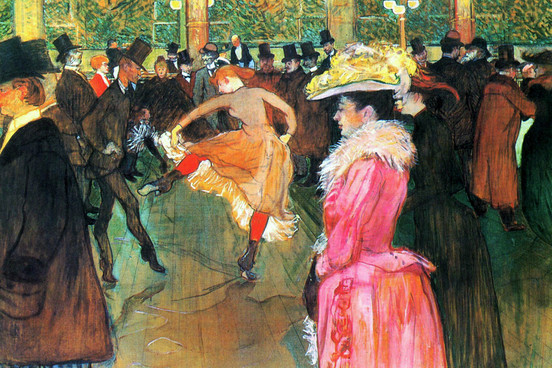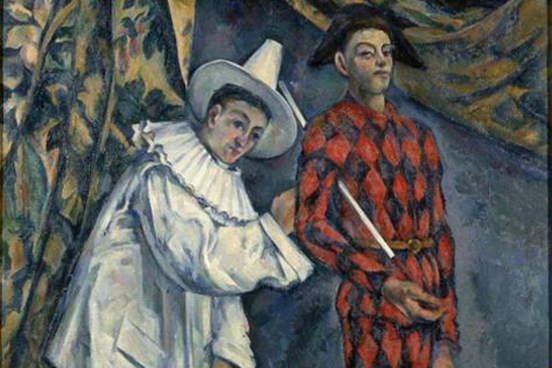
Esprit de l’escalier
\ess-preed-less-kah-lyay\
We’ve all been in a situation when we think of the perfect thing to say in response to something provocative or insulting too late to say it in the moment. When the right words come, the right time is past. The French call this too-late inspiration l’esprit de l’escalierplay . Esprit is the root of our word spirit, but in French can also mean “wit,” so this phrase is translated literally as “wit of the staircase” and is used to mean repartee thought of too late, on the way home.
The expression was coined by Denis Diderot, the French philosopher of the 1700s, so we can imagine that the grand staircase of a château or manor is what he had in mind.
Is Will Smith experiencing l’esprit de l’escalier after Slapgate?: Oscar night incident provides teachable moment on the value of ‘staircase wit’
— (headline) Irish Times (Dublin, Ireland), 31 Mar. 2022

Outré
\oo-TRAY\
When words are borrowed from other languages, it can sometimes seem that the idea the word expresses somehow goes beyond the limits of the language that adopted the new word. In the case of outréplay , that’s also a clue as to the borrowed word’s meaning. Outré means “violating convention or propriety” or “bizarre.” It is used to describe things that are unusual, extravagant, or shocking in some way:
Because of this, there’s always been a sense of him being too outré for traditional outlets: too direct, too bumptious, too partial, too much.
— Miranda Sawyer, The Observer (London, Eng.), 23 Apr. 2022That's partly because the visual excess of "Moulin Rouge," taking its cue from its sourcing of the famously outre Baz Luhrmann musical, matches the gestalt of the palace formerly known as the Oriental Theatre.
— Chris Jones, Chicago Tribune, 22 Apr. 2022
Outré comes from the French verb outrer, which means “to exaggerate” or “to outrage.” Even though the word does refer to things “outside” of conventions, beware that it’s just a coincidence that outrer looks like the English word outer; it’s ultimately from the Latin word ultra, which means “beyond” or “farther.”

Reconnoiter
\ree-kuh-NOY-ter\
Reconnoiterplay is the less familiar verb form of reconnaissanceplay ; if reconnaissance means “a preliminary survey to gain information,” then reconnoiter means “to go to a place in order to gain information.” Unsurprisingly, it is most often used in military contexts.
Reconnoiter comes from the French word that means “to recognize,” based on the verb connaître which means “to know,” so both recognize and reconnoiter literally mean “to know again” according to their shared etymology. This French word is related to other English words including recognize, cognizant, and connoisseur.
Reconnoiter is spelled with an o and reconnaissance with an a because they were borrowed into English at different times; the o spelling reflects an older French spelling. This is also true of connoisseur, since the way that word is spelled today in French (connaisseur) reflects the change in spelling in French after the word came into English.
The g in English words like recognize and cognizant was introduced by Renaissance scholars who wanted English to show the Latin ancestry of these French borrowings. The ultimate Latin root of all these words is cognoscere.
I like that zone where you're going about three miles an hour but nothing can stop you. A few hours of that, or a few days of that, and when you raise your head to reconnoiter, some stuff has gotten done.
— Wisconsin State Journal_ (Madison, WI), 17 Apr. 2022

Louche
\LOOSH\
When being extremely judgmental about something, we are likely to narrow our eyes. In fact, sometimes that’s all we need to do in order to communicate disapproval. Without knowing it, we are expressing the history of louche. Loucheplay means “not reputable or decent”:
The onstage hijinx are tinctured with a pinch of decadence. Don Giovanni's servant Leporello (the excellent Justin Welsh) wears a studded dog collar and a black motorcycle jacket. A dance sequence at Zerlina's wedding features gaudily costumed locals who resemble 2 a.m. refugees from a louche nightclub.
— Adrian Chamberlain, Times-Colonist (Victoria, Can.), 23 Apr. 2022
Louche comes from the French word that means “cross-eyed” or “squint-eyed” and eventually gained a figurative meaning of “shady” or “devious.” It ultimately comes from the Latin word luscus, which means “one-eyed.”

Au courant
\oh-koo-RAHN\
Au courantplay is a fancy way of saying “current” in connection with both recent information and fashion.
The term has been dropped into English sentences since the mid-1700s, and its use has shown a variety of subtle distinctions in meaning. It can be used to mean “fully informed,” as in “they seemed to be au courant of everything that had happened.” It can mean “up-to-date” or “abreast,” as in “the dictionary stays au courant through constant revision.” It has the straightforward meaning of “stylish” or “fashionable” as in “au courant clothes.” Finally, it can mean “aware,” “informed,” or “cognizant,” as in “we were au courant of what happened.”
The French word courant comes from the verb courir, which means “to run.”
Superimposing old-school glamour with an au courant touch, designer Preeti Jain's 'Ancienne' collection comprises of her signature Nirmooha statement-making prints reconciled with the vintage-inspired array of easy chic separates.
— Akshay Kaushal, The Times of India (New Delhi, Ind.), 23 Mar. 2022

Sabotage
\SAB-uh-tahzh\
Sabotageplay means “deliberate destruction,” but its oldest meaning in English is more specific:
destruction of an employer's property (as tools or materials) or the hindering of manufacturing by discontented workers
A sabot is a wooden shoe, formerly worn in rural Europe, and it later became the word for a metal “shoe” or bracket used in construction and laying railroad tracks. The French verb saboter originally meant “to secure with a metal bracket” but also came to mean “to botch” or “to do in a clumsy or slipshod way.” Finally, it came to have the “deliberate destruction,” a meaning, which, some have said, came about because of striking workers who threw their wooden shoes in the factory machinery to cause it to stop and break.
Remarkably, small units of this army carried on an assassination and sabotage campaign for years after the war ended, with the last insurgent commander killed in a shootout near Lviv in 1950.
— Anna Reid, Foreign Affairs (New York, NY), May/Jun. 2022

Gauche
\GOHSH\
Gaucheplay is the French word for “left.” Its secondary or figurative meaning was “awkward” or “clumsy,” and that is the sense that came into English in the 1700s. Gauche is only one of several words that betray a prejudice against left-handedness; it came from a Germanic root and replaced the Latin-based word senestre—the origin of sinister—to mean “left” in French. Words like adroit and dexterity, with positive connotations, come from words for right-handedness.
Parents usually steer clear of giving the impression they have a favourite. And the Queen, with her reputation for discretion, is unlikely be so gauche to let slip that she has hers.
— Lindy McDowell, Belfast Telegraph (Belfast, IR), 23 Apr. 2022

Entrepreneur
\ahn-truh-pruh-NER\
Entrepreneurplay is a word that has come to have connotations of imagination, daring, and success—qualities that seem to be universally admired in contemporary business. And, in fact, it’s a new word in English, dating only to the mid-1800s—the reason it has kept its very French spelling and pronunciation. The much older word enterprise shares its roots with entrepreneur; an entrepreneur is one who starts or manages an enterprise: an “enterpriser,” if you will.
In French, entrepreneur can also mean “contractor,” as in a person who oversees the construction of a building. It’s also used to mean “undertaker” or “funeral director.” The words undertaker and entrepreneur are very similar: an entrepreneur “undertakes” a business, and the French word comes from prendre, meaning “to take.”
As Aroostook County continues to struggle with youth out-migration, one city is a promising destination for young entrepreneurs.
— Melissa Lizotte, Bangor Daily News (Bangor, ME), 23 Apr. 2022

French Sauces
Roux, rouille and other saucy terms (and how to say them)
SEE THE LIST >




